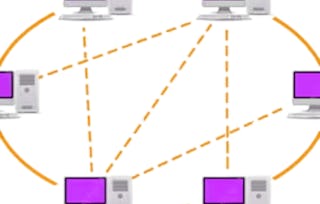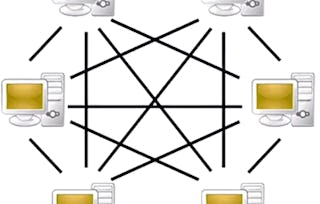In this course, we give an in-depth study of the TCP/IP protocols. We examine the details of how IP enables communications across a collection of networks. We pay particular attention to the hierarchical structure of IP addresses and explain their role in ensuring scalability of the Internet. The role of address prefixes and the uses of masks are explained in details. We review in details about TCP three-way handshake, flow control, and congestion control. Furthermore, we provide an introduction to some advanced topics, including Multicast, SDN and security

TCP/IP and Advanced Topics

TCP/IP and Advanced Topics
This course is part of Computer Communications Specialization

Instructor: Xiaobo Zhou
56,188 already enrolled
Included with
753 reviews
Skills you'll gain
Details to know

Add to your LinkedIn profile
See how employees at top companies are mastering in-demand skills

Build your subject-matter expertise
- Learn new concepts from industry experts
- Gain a foundational understanding of a subject or tool
- Develop job-relevant skills with hands-on projects
- Earn a shareable career certificate

There are 5 modules in this course
This module examines the structure of the network layer: the IP packet, the details of IP addressing, and then focuses on subnetting technique that can efficiently utilize IP address space.
What's included
5 videos7 readings2 assignments1 discussion prompt
This module examines class-less inter-domain routing CIDR technique that can efficiently utilize IP address space, discusses how IP is complemented by DHCP and ARP protocols, and motivations for introducing a new version of IPv6.
What's included
4 videos4 readings2 assignments1 discussion prompt
This module discusses the structure of the transport layer UDP and TCP. It focuses on TCP, including the TCP three-way handshake, flow control, and congestion control mechanisms.
What's included
4 videos5 readings2 assignments1 discussion prompt
This module discusses mobile IP, introduces approaches to multicast routing, discusses the relationships between OpenFlow, DSN and NFV, and concludes by introducing some network security threats.
What's included
4 videos4 readings2 assignments1 discussion prompt
This is a comprehensive peer review assessment
What's included
1 reading1 peer review
Earn a career certificate
Add this credential to your LinkedIn profile, resume, or CV. Share it on social media and in your performance review.
Instructor

Offered by
Explore more from Computer Security and Networks

University of Colorado System

University of Colorado System

University of Colorado System
Why people choose Coursera for their career

Felipe M.

Jennifer J.

Larry W.

Chaitanya A.
Learner reviews
- 5 stars
78.35%
- 4 stars
16.60%
- 3 stars
3.05%
- 2 stars
0.39%
- 1 star
1.59%
Showing 3 of 753
Reviewed on Jul 7, 2019
all the teachers were really helpful and they taught well.
Reviewed on Nov 26, 2020
I've learnt a lot from this course, I recommend this course to anyone interested in learning networking.
Reviewed on Sep 7, 2020
great lectures i have learned lot of this things from it

Open new doors with Coursera Plus
Unlimited access to 10,000+ world-class courses, hands-on projects, and job-ready certificate programs - all included in your subscription
Advance your career with an online degree
Earn a degree from world-class universities - 100% online
Join over 3,400 global companies that choose Coursera for Business
Upskill your employees to excel in the digital economy
Frequently asked questions
To access the course materials, assignments and to earn a Certificate, you will need to purchase the Certificate experience when you enroll in a course. You can try a Free Trial instead, or apply for Financial Aid. The course may offer 'Full Course, No Certificate' instead. This option lets you see all course materials, submit required assessments, and get a final grade. This also means that you will not be able to purchase a Certificate experience.
When you enroll in the course, you get access to all of the courses in the Specialization, and you earn a certificate when you complete the work. Your electronic Certificate will be added to your Accomplishments page - from there, you can print your Certificate or add it to your LinkedIn profile.
Yes. In select learning programs, you can apply for financial aid or a scholarship if you can’t afford the enrollment fee. If fin aid or scholarship is available for your learning program selection, you’ll find a link to apply on the description page.
More questions
Financial aid available,
¹ Some assignments in this course are AI-graded. For these assignments, your data will be used in accordance with Coursera's Privacy Notice.

